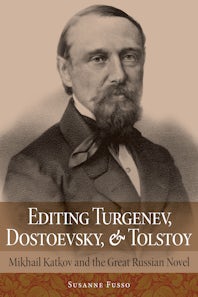What Russian literary figure called Dostoevsky “a fop perfumed with patchouli” and prompted Tolstoy to summarize Anna Karenina as the story of “a certain lady who abandoned her husband, got angry at various things, and threw herself under a railroad car?”
The answer is Mikhail Nikiforovich Katkov (1818-87), the editor and publisher of the Russian Herald and the Moscow News. Editing Turgenev, Dostoevsky, and Tolstoy: Mikhail Katkov and the Great Russian Novel is a study of the role Katkov played in the creation of some of the most significant works of Russian literature. The book provides as dispassionate an account as possible of a man who inspired vehement passions, both positive and negative. Katkov was demonized in the Soviet era because of his conservative political activity in support of Russian nationalism and the autocratic state. In the Putin era he is being lionized as the “savior of the fatherland” (the title of a 2013 article on him). My study strives to offer a view of his literary activity that avoids these two extremes, giving him his due as the important figure he was, without vilification or canonization.
The book provides as dispassionate an account as possible of a man who inspired vehement passions, both positive and negative.
The study traces Katkov’s literary (and sometimes personal) relationships with the foundational literary critic Vissarion Belinsky, the novelist and critic Evgenia Tur, and the major novelists Ivan Turgenev, Fyodor Dostoevsky, and Lev Tolstoy. Turgenev complained that if it were not for Katkov, he would never have published Fathers and Sons, which most contemporary readers consider his finest novel. After carrying on an intense polemic with Katkov in the pages of their respective journals in 1861-63, Dostoevsky published all his most celebrated novels in Katkov’s Russian Herald: Crime and Punishment (1866), The Idiot (1868), The Devils (1871-72), and The Brothers Karamazov (1879-80); his landmark Pushkin speech was published in Katkov’s newspaper Moscow News in June 1880, six months before Dostoevsky’s death.
Tolstoy published numerous works in the Russian Herald, including the opening sections of War and Peace. But his relationship with Katkov ended in bitterness, as Katkov refused to publish the final part of Anna Karenina because it ridicules and attacks the movement of Russian volunteers traveling to Serbia to fight with the Serbs against their Turkish overlords. What is less obvious about Anna Karenina in relation to Katkov is that this part is only the most blatant and explicit of Tolstoy’s attacks on Katkov’s favorite programs to be found in it. A study of Anna Karenina in relation to articles in the Russian Herald and the Moscow News shows that Tolstoy’s treatment of issues such as railroads, industrialization, education of women, and spiritualism are directed against Katkov’s policies and programs. Anna Karenina derives narrative energy from attacking the program of the Russian Herald in the pages of the Russian Herald.
The conclusion considers the nature of Katkov’s role as both editor and patron.
The conclusion considers the nature of Katkov’s role as both editor and patron. As a writer of articles and editorials, Katkov presented a clear program for Russian literature, which was to affirm the political and historical importance of the Russian nationality as expressed through its language. As a powerful and entrepreneurial publisher, he also sought, encouraged, and paid for the writing of the works that were to embody that program, the works we now recognize as among the greatest achievements of Russian literature.
*Featured image: Dostoevsky, Katkov, Tolstoy. Credit: Wikimedia Commons, Wikimedia Commons, Wikimedia Commons (left to right).

Read more about this book.
Susanne Fusso is Marcus L. Taft Professor of Modern Languages and Professor of Russian, East European, and Eurasian Studies at Wesleyan University. Her most recent translation of Sergey Gandlevsky’s work is Illegible.

